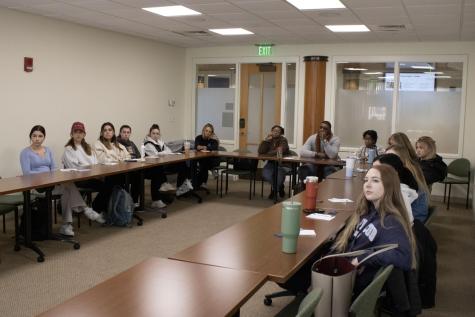Department of Cultural and Global Engagement honors women in entrepreneurship to close out Women’s History Month
April 5, 2023
Quinnipiac University’s Department of Cultural and Global Engagement held an inclusive conversation on women in entrepreneurship amid Women’s History Month on March 29 to empower women with business ideas to step into the industry.
The conversation was facilitated by Patrice Luoma, director for the M&T Bank Center for Innovation and Entrepreneurship and professor of entrepreneurship and strategy, and Tuvana Rua, associate professor of management.
Luoma began by asking attendants to name an entrepreneur and a small business.

Very few attendants named entrepreneurs that were women, and those that did named well-known celebrities like Oprah Winfrey, Rihanna and Kim Kardashian. When asked why attendants listed mainly male entrepreneurs, some suggested it was because most entrepreneurs are men.
Luoma’s presentation defined an entrepreneur as a person who organizes and operates a business taking on greater than normal financial risks to do so. A small business owner typically starts a business within their local community to provide a service to a specific target audience.
“A lot of male entrepreneurs go into entrepreneurship because they are individualistic and they want to shine and they become the center of attention as a result of that,” Rua said. “Women choose entrepreneurship for different reasons. Women are more social beings and are about elevating the group. As a result of that, they might not shine in the public eye as much as their male counterparts.”
Women entrepreneurs tend to rely on themselves as most are self-employed. Females make up 82.5% of lone entrepreneurs — compared to 69.8% of males — and they are almost half as likely as men to have a partner, according to Al Bees.
Emotional intelligence and the amount of funding for their businesses are distinct differences between male and female entrepreneurs. Women entrepreneurs tend to have higher emotional intelligence but less funding than their male counterparts.
“Women lead with more emotional intelligence and they create better bonding with their subordinates,” Rua said. “They are very much into coaching and mentoring so they have a growth mindset.”
Globally, one-third of businesses are owned by women, according to the World Bank. 44% of women-owned businesses are childcare, beauty salons and home healthcare.
There are various push and pull factors that affect women’s entrepreneurship and play a significant role in if they choose to become entrepreneurs. Push factors for women entrepreneurs are long hours, lack of flexibility with work-life balance and the level of expectation for perfectionism. Pull factors include the desire to be challenged, independence, a positive work environment, a flexible work schedule, higher earnings and the ability to balance work and family responsibilities.

Hewlett-Packard, an American informational technology company, made a discovery as to why there were not as many women in top management positions. According to Forbes, “Men are confident about their ability at 60%, but women don’t feel confident until they’ve checked off each item on the list.”
The women at HP only applied for a promotion when they believed they met the full qualifications for the job that was listed, compared to men, who applied when they thought they could meet at least 60% of the job requirements. This explains why push factors deter women from entrepreneurship.
One of the common challenges that most entrepreneurs face is getting people to listen to their ideas and being taken seriously.
“Support yourself with like-minded people who are supportive to build a network and here at Quinnipiac we have access to a network of people that will be supportive of your ideas,” Luoma said.
Many attendants had businesses or business ideas of their own. The Center for Innovation and Entrepreneurship provides opportunities for students to learn more to develop their innovative and entrepreneurial potential.
Similar to previous inclusive conversations, the majority of attendants were women. Many students noted a lack of male presence and were not surprised.
“I think that even though it is for women that doesn’t necessarily mean that only women need to attend,” said Emma Gacek, a first-year public relations major. “I think that everything should be geared toward everyone, not just a specific group.”







